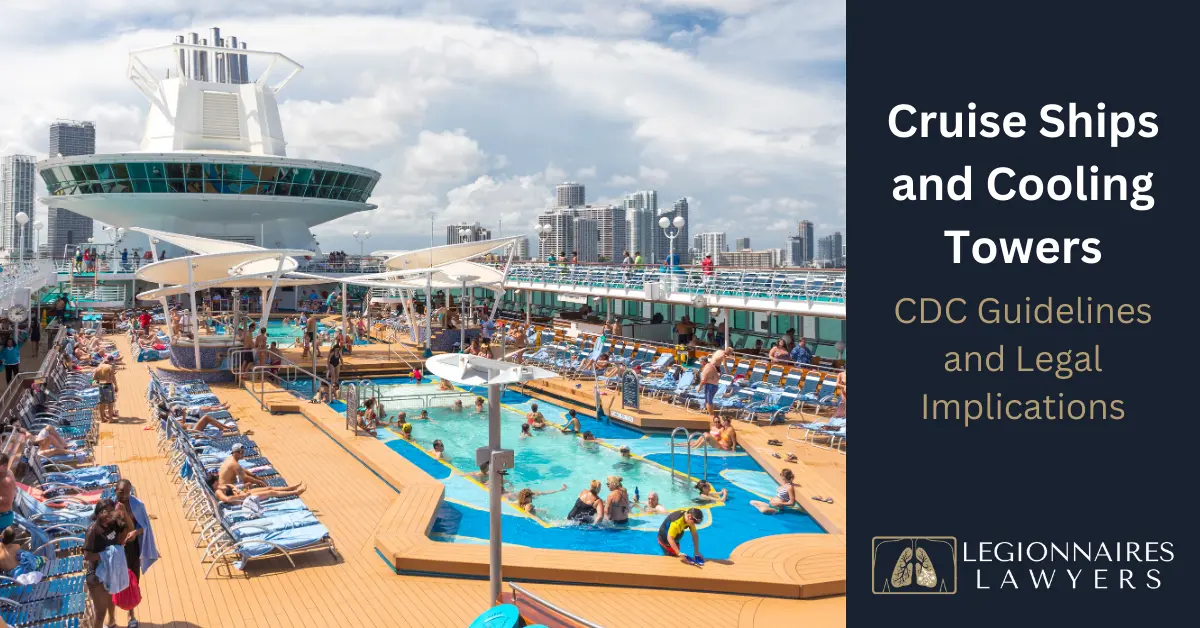
Cruise vacations promise luxury, relaxation, and adventure. But behind the scenes, cooling towers onboard these floating cities can become breeding grounds for deadly bacteria. When Legionella enters a ship’s air-conditioning or water systems, it can spread undetected until passengers and crew start falling seriously ill.
That’s exactly what’s happened in over 30 cases between 2015 and 2022, highlighting a serious vulnerability in the cruise industry’s health and safety systems.
Cruise ships use complex water systems (including cooling towers) that, if poorly maintained, can harbor Legionella bacteria and trigger outbreaks of Legionnaires’ disease. CDC guidelines aim to reduce this risk through water management protocols, but failure to comply may result in illness, lawsuits, or even criminal liability.
What’s worse, many outbreaks could have been prevented with proper water system maintenance and compliance with CDC Vessel Sanitation Program (VSP) standards. Unfortunately, some cruise lines cut corners, skip testing, or fail to train their teams—putting lives at risk and opening the door to costly litigation, class-action lawsuits, and long-term reputational damage.
In this blog, we’ll break down how CDC guidelines specifically target cooling tower risks, the legal consequences of noncompliance, and the steps responsible cruise operators should be taking right now to avoid becoming the next headline.
Sources include the CDC Vessel Sanitation Program, World Health Organization reports, and maritime health and safety compliance protocols to ensure the information presented here is both current and authoritative.
Understanding Cooling Towers and Their Role on Cruise Ships
Cooling towers are essential to a cruise ship’s HVAC and water circulation systems, helping regulate temperature across everything from guest cabins to crew quarters.
But these towers can also create the perfect storm for Legionella growth, especially when warm water, biofilm, and stagnant areas collide.
Unlike land-based buildings, cruise ships are closed ecosystems with limited fresh water turnover, making effective water treatment a constant challenge. When cooling towers aren’t properly maintained or tested, a single point of contamination can expose thousands, including elderly passengers and immunocompromised crew, to the risk of Legionnaires’ disease.
CDC Guidelines for Cooling Towers on Cruise Ships
The CDC’s Vessel Sanitation Program (VSP) provides strict protocols designed to prevent Legionella growth in maritime water systems— including cooling towers, spas, showers, and drinking water tanks.
These guidelines emphasize the importance of a comprehensive water management plan: maintaining hot water temperatures above 124°F, using biocides like chlorine to disinfect the system, and ensuring proper filtration. Cruise operators are required to log and report maintenance activities, conduct routine microbial testing, and implement corrective actions immediately if Legionella is detected.
Noncompliance can result in public health violations, ship detainment, or even denial of docking privileges, making adherence to these guidelines critical not just for health, but also for continued operations.
Legal Implications for Cruise Ship Operators
Cruise ship operators are held to a high legal standard when it comes to safeguarding passenger health. Especially so under U.S. maritime law and international regulations.
If passengers or crew members become ill due to improperly maintained cooling towers, operators may be held civilly liable for damages including medical expenses, pain and suffering, lost wages, and even wrongful death. Legal consequences intensify if the operator ignored CDC guidance or failed to take reasonable steps to prevent exposure.
Courts have previously found cruise lines negligent or grossly negligent in Legionnaires’ cases, especially when there’s a pattern of poor maintenance, lack of outbreak protocols, or prior documented issues. Simply put: failure to act can result in multi-million dollar lawsuits and long-term reputational harm.
Preventing Legionella Outbreaks and Ensuring Safety
The most effective way to prevent Legionella outbreaks is a proactive, layered approach to water safety.
Cruise lines should implement a ship-specific Legionella risk management plan that includes routine temperature control, chemical treatments, biofilm prevention, and periodic lab testing of all water systems. Staff must be trained to recognize outbreak warning signs— from discolored water to unexpected fevers among passengers— and act quickly to report concerns to onboard medical teams and public health agencies.
Ultimately, investing in prevention not only protects lives. It also reduces the risk of mass litigation, bad press, and port authority investigations that can disrupt entire voyages.
Legal Actions and Compensation for Victims of Legionnaires’ Disease
When Legionnaires’ disease strikes aboard a cruise ship, victims— whether passengers or crew— may be entitled to legal compensation if negligence or improper maintenance played a role. Cruise lines have a duty of care to maintain safe conditions, including proper oversight of cooling towers. If that duty is breached, legal claims may follow. Here’s what victims and families should know:
- Grounds for Lawsuits: Claims may include medical negligence, failure to follow CDC guidelines, or delayed response to known risks in water systems.
- Types of Compensation: Victims may pursue medical expenses, lost wages, pain and suffering, and in severe cases, wrongful death settlements.
- Evidence That Matters:
- Proof of presence on the ship during the incubation window
- Positive Legionella diagnosis and test results
- Documentation of cruise line negligence (e.g., inspection failures, ignored CDC protocols)
- Important Deadlines: Maritime injury claims typically follow different timelines than land-based cases. Consult a maritime attorney quickly to avoid missing your legal window.
These claims are complex, but experienced legal teams— like ours— can guide victims through the process and ensure their voices are heard.
Protecting Passengers, Preventing Lawsuits: Why Vigilance Matters
Cruise ships must treat cooling towers not as background systems, but as frontline public health responsibilities. Adhering to CDC guidelines isn’t optional; it’s the key to protecting lives and avoiding devastating legal consequences.
With Legionnaires’ cases tied to cruise outbreaks making headlines and courtrooms, prevention is the only safe course. For operators and passengers alike, the message is clear: when safety lapses, accountability follows.


